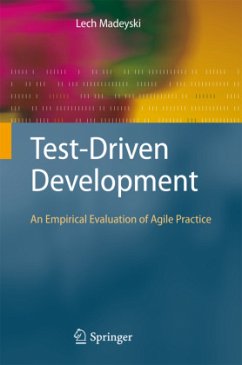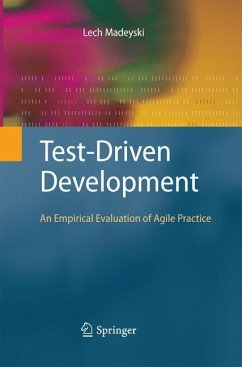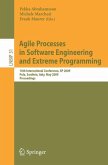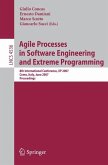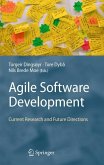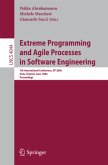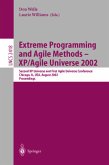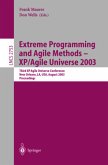Agile methods are gaining more and more interest both in industry and in research. Many industries are transforming their way of working from traditional waterfall projects with long duration to more incremental, iterative and agile practices. At the same time, the need to evaluate and to obtain evidence for different processes, methods and tools has been emphasized.
Lech Madeyski offers the first in-depth evaluation of agile methods. He presents in detail the results of three different experiments, including concrete examples of how to conduct statistical analysis with meta analysis or the SPSS package, using as evaluation indicators the number of acceptance tests passed (overall and per hour) and design complexity metrics.
The book is appropriate for graduate students, researchers and advanced professionals in software engineering. It proves the real benefits of agile software development, provides readers with in-depth insights into experimental methods in the context of agile development, and discusses various validity threats in empirical studies.
Lech Madeyski offers the first in-depth evaluation of agile methods. He presents in detail the results of three different experiments, including concrete examples of how to conduct statistical analysis with meta analysis or the SPSS package, using as evaluation indicators the number of acceptance tests passed (overall and per hour) and design complexity metrics.
The book is appropriate for graduate students, researchers and advanced professionals in software engineering. It proves the real benefits of agile software development, provides readers with in-depth insights into experimental methods in the context of agile development, and discusses various validity threats in empirical studies.
"This work is really geared toward researchers, software architects, and engineering and QA professionals who are looking for relevant metrics to measure the feasibility of the agile implementation at their respective organizations." -- from the review by Joel R. Singh on www.stickyminds.com
"In summary the book provides many valuable insights both to practitioners in terms of the evidence for test-first programming and to researchers in terms of clear illustrations of how new processes, methods and tools can be evaluated using experimentation in software engineering. It is pleasure to recommend this book to practitioners and researchers being interested in agile methods or empirical evaluation or both of them." -- from the Foreword by Claes Wohlin; Blekinge Institute of Technology, Sweden"
"This book makes a big step forward in a scientific approach to software engineering in general, and agile practices in particular. I am a practitioner and this is one of the very few books I saw that are in line with my gut feeling and day-to-day experience with Test-Driven Development and code quality. I believe this book will also help stop some of us from blindly practising agile methods as voo-doo rituals and shed some light on the facts behind it." -- Wojciech Biela; Agile Evangelist, Development Head; EMPiK.com and ExOrigo
"[...] The author helps the reader appreciate the rationale behind the use of scientific research methods in software engineering. The strength of the book lies in the appreciation of empirical software engineering methods. A few of the book's strengths are: its explanation of the research methods through modeling processes in unified modeling language (UML), the validation of models through hypotheses, the use of quantitative methods available through SPSS software, and the presentation of the examples through an incremental approach. [...]
I recommend the book to research scholars who plan to conduct multidisciplinary research in software engineering." -- ACM Computing Reviews, Harekrishna Misra, January 2011
"In summary the book provides many valuable insights both to practitioners in terms of the evidence for test-first programming and to researchers in terms of clear illustrations of how new processes, methods and tools can be evaluated using experimentation in software engineering. It is pleasure to recommend this book to practitioners and researchers being interested in agile methods or empirical evaluation or both of them." -- from the Foreword by Claes Wohlin; Blekinge Institute of Technology, Sweden"
"This book makes a big step forward in a scientific approach to software engineering in general, and agile practices in particular. I am a practitioner and this is one of the very few books I saw that are in line with my gut feeling and day-to-day experience with Test-Driven Development and code quality. I believe this book will also help stop some of us from blindly practising agile methods as voo-doo rituals and shed some light on the facts behind it." -- Wojciech Biela; Agile Evangelist, Development Head; EMPiK.com and ExOrigo
"[...] The author helps the reader appreciate the rationale behind the use of scientific research methods in software engineering. The strength of the book lies in the appreciation of empirical software engineering methods. A few of the book's strengths are: its explanation of the research methods through modeling processes in unified modeling language (UML), the validation of models through hypotheses, the use of quantitative methods available through SPSS software, and the presentation of the examples through an incremental approach. [...]
I recommend the book to research scholars who plan to conduct multidisciplinary research in software engineering." -- ACM Computing Reviews, Harekrishna Misra, January 2011
"This work is really geared toward researchers, software architects, and engineering and QA professionals who are looking for relevant metrics to measure the feasibility of the agile implementation at their respective organizations." - from the review by Joel R. Singh on www.stickyminds.com
"In summary the book provides many valuable insights both to practitioners in terms of the evidence for test-first programming and to researchers in terms of clear illustrations of how new processes, methods and tools can be evaluated using experimentation in software engineering. It is pleasure to recommend this book to practitioners and researchers being interested in agile methods or empirical evaluation or both of them." - from the Foreword by Claes Wohlin; Blekinge Institute of Technology, Sweden
"This book makes a big step forward in a scientific approach to software engineering in general, and agile practices in particular. I am a practitioner and this is one of the very few books I saw that are in line with my gut feeling and day-to-day experience with Test-Driven Development and code quality. I believe this book will also help stop some of us from blindly practising agile methods as voo-doo rituals and shed some light on the facts behind it." - Wojciech Biela; Agile Evangelist, Development Head; EMPiK.com and ExOrigo
"[...] The author helps the reader appreciate the rationale behind the use of scientific research methods in software engineering. The strength of the book lies in the appreciation of empirical software engineering methods. A few of the book's strengths are: its explanation of the research methods through modeling processes in unified modeling language (UML), the validation ofmodels through hypotheses, the use of quantitative methods available through SPSS software, and the presentation of the examples through an incremental approach. [...] I recommend the book to research scholars who plan to conduct multidisciplinary research in software engineering." - ACM Computing Reviews, Harekrishna Misra, January 2011
"In summary the book provides many valuable insights both to practitioners in terms of the evidence for test-first programming and to researchers in terms of clear illustrations of how new processes, methods and tools can be evaluated using experimentation in software engineering. It is pleasure to recommend this book to practitioners and researchers being interested in agile methods or empirical evaluation or both of them." - from the Foreword by Claes Wohlin; Blekinge Institute of Technology, Sweden
"This book makes a big step forward in a scientific approach to software engineering in general, and agile practices in particular. I am a practitioner and this is one of the very few books I saw that are in line with my gut feeling and day-to-day experience with Test-Driven Development and code quality. I believe this book will also help stop some of us from blindly practising agile methods as voo-doo rituals and shed some light on the facts behind it." - Wojciech Biela; Agile Evangelist, Development Head; EMPiK.com and ExOrigo
"[...] The author helps the reader appreciate the rationale behind the use of scientific research methods in software engineering. The strength of the book lies in the appreciation of empirical software engineering methods. A few of the book's strengths are: its explanation of the research methods through modeling processes in unified modeling language (UML), the validation ofmodels through hypotheses, the use of quantitative methods available through SPSS software, and the presentation of the examples through an incremental approach. [...] I recommend the book to research scholars who plan to conduct multidisciplinary research in software engineering." - ACM Computing Reviews, Harekrishna Misra, January 2011

